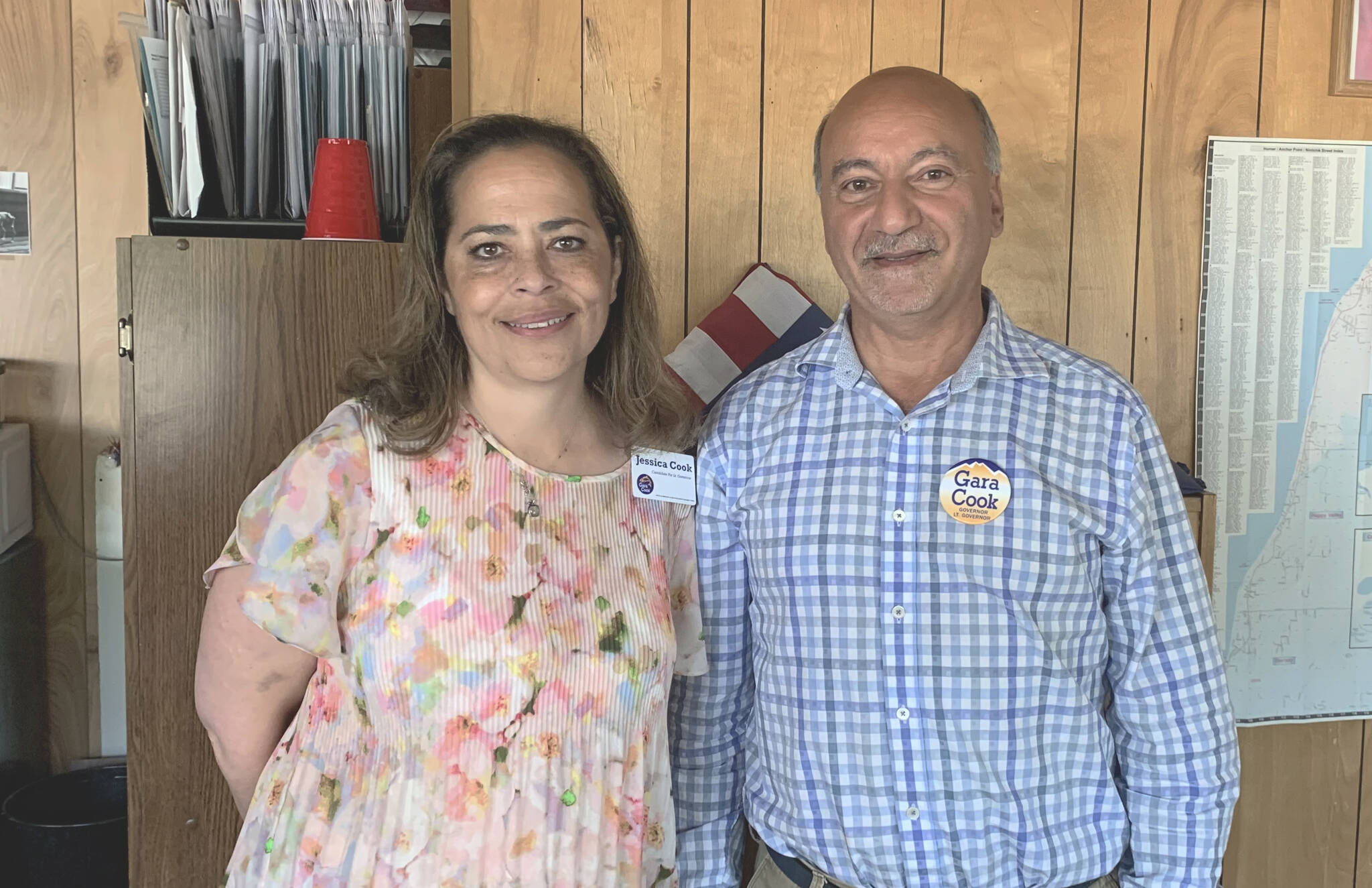Gubernatorial hopeful Les Gara and running mate, Jessica Cook, spent time this week campaigning around the Kenai Peninsula. Their tour brought them to the Peninsula Clarion offices on Thursday, where the two outlined their vision for the future of Alaska and their priorities heading into a busy election season.
Gara, a former Alaska state lawmaker, is originally from Fairbanks but moved to Anchorage to work on the Exxon Valdez Oil Spill response. He grew up in the foster care system in New York after his father was killed. He announced last summer that he would be challenging incumbent Gov. Mike Dunleavy for Alaska’s top political seat.
Cook is a lifelong Alaskan who holds two master’s degrees in education and most recently worked as a teacher for the Anchorage School District. Like Gara, Cook has also experienced her share of adversity. Following her mother’s death, she was adopted at age 3 into a family that she says inspired her passion for public service.
Cook said several things need to change when it comes to education in Alaska, including how the state hires and retains teachers and how education is funded at the state level. She said there needs to be more consistent funding for education in Alaska that could prevent some of the uncertainty districts face when deciding how many people they can keep on at the end of each school year.
The lack of pension and retirement benefits for educators can also make it difficult to keep educators in the state. Alaska is the only state in the country that doesn’t offer a pension or Social Security benefits for teachers. Instead, teachers use a 401(k)-style retirement system that some say is not enough.
“Every Alaskan who wants to learn and further their education has the right and deserves to have the best quality educators to learn from and that means we need to attract and retain the best,” Cook said. “We need to go above and beyond to restructure the way we’re looking at education.”
In talking with voters on the Kenai Peninsula, Gara said fisheries emerged as a clear priority. The gubernatorial hopeful has criticized Dunleavy’s support for the controversial Pebble Mine project in Bristol Bay, which Gara on Thursday called irresponsible and a threat to some of the world’s best fishing waters.
Gara also condemned the near-closure of Cook Inlet’s federal waters to commercial fishing and the damage wrought by factory trawlers. Because the governor of Alaska has the ability to nominate people to the North Pacific Fishery Management Council, Gara said the council’s bad decisions can be traced back to Dunleavy.
“That’s a healthy red salmon fishery,” Gara said of the EEZ. “Commercial fishermen should be allowed to fish in those federal waters.”
When it comes to finances, Gara said he isn’t putting too much stock into the state budget for the upcoming fiscal year, which Dunleavy signed earlier this week. Gara said he wants to see money the state uses for subsidies to oil companies go toward other priorities, such as education, deferred maintenance and maybe even green energy projects.
The state’s current surge in revenue, Gara said, is tied to a spike in oil prices due to the Russian invasion of Ukraine. He fears Dunleavy will go back to making cuts to programs Gara supports once the price of oil goes back down.
“You can’t have a policy based on one year of Russian war money,” Gara said.
Among the other issues Gara and Cook said would be priorities of their administration are reproductive rights and election security. Gara has called himself the only pro-choice candidate running for governor and both he and Cook oppose a constitutional convention, which Cook said would be like opening “Pandora’s box.”
Both candidates want to see Alaska implement a ballot curing process and are pushing for the Alaska Division of Elections to communicate as clearly as possible how voters should mark ballots in the upcoming special general and regular primary elections. On the Kenai Peninsula, hundreds of ballots were rejected during the state’s special primary election. In one state House district, the rejection rate topped 17%.
Gara said that, ultimately, he is running for governor because he doesn’t see a future for the state of Alaska under current leadership. Both he and Cook want to stop the state’s outmigration, invest more in education and expand opportunities for all Alaskans.
Incumbent Gov. Mike Dunleavy, Kenai Peninsula Borough Mayor Charlie Pierce, Alaska House Rep. Christopher Kurka, Libertarian candidate William Toien, Republican Bruce Walden and former Gov. Bill Walker are also vying for the position of governor.
The 2022 state election primary will be held on Aug. 16. Alaska’s general election is on Nov. 8. More information about the election can be found at elections.alaska.gov.
Reach reporter Ashlyn O’Hara at ashlyn.ohara@peninsulaclarion.com.

